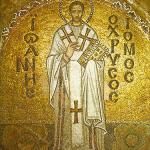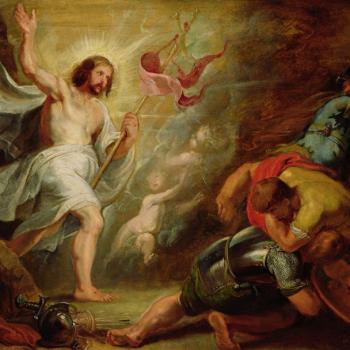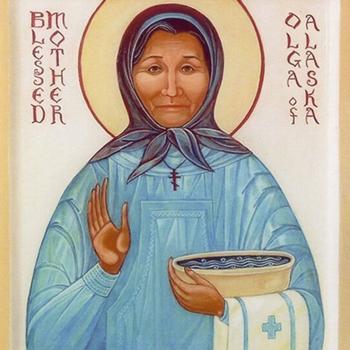Christmas Meditation 2
The Word Became Flesh
Saint Augustine
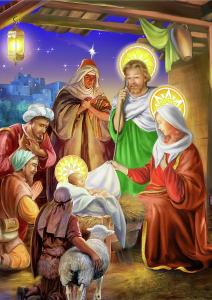
There is no Christmas story in the Gospel of John. Or, is there? Here’s how the Gospel of John opens. “In the beginning was the Word, and the Word was with God, and the Word was God. He was in the beginning with God” (John 1:1-2).
Now, look what happens in verse 14. “And the Word became flesh and lived among us, and we have seen his glory, the glory as of a father’s only son, full of grace and truth” (John 1:14).
Word (logos) and Truth (alethia) became flesh. This is the Christmas story told for philosophers.
In this Christmas meditation, let’s ponder the idea that the word became flesh in Bethlehem. In a later Christmas meditation, we’ll look at Truth becoming flesh.
Augustine on the Word became Flesh
Who better to start off our Christmas meditation on the Word—the Logos—than Saint Augustine (354-430 AD). Few can twist and turn our minds into intellectual pretzels better than Augustine. Let’s look at what the Bishop of Hippo said on Feast of the Nativity.
Augustine, Christmas Sermon 188
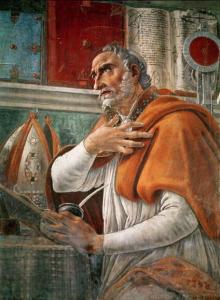
Augustine writes. “It is not strange, I say, for us to fail to find words in which to speak of the Word by whom the word was spoken which gave being to us who would now say something about Him. For our mind brings words into existence after they have been thought over and formed, but our mind itself is formed by the Word. Nor does man fashion words in the same way in which man was made by the Word, because the Father Himself did not beget His only Word in the same way in which He made all things through the Word. For God begot God, but the Begettor and the Begotten are one and the same God. Moreover, God made the world but the world passes while God remains. Although these things which were made certainly did not make themselves, He by whom all things were made was made by no one. It is not strange, then, that man, one of those created things, does not know how to discuss the Word by whom all things were made.”
Human Words and the Divine Word
The saint fails to find words with which to talk about the Word. Mmmmm? What could that mean?
Let’s compare human words with the divine word. When I speak and you listen, the sound of my word endures for only a fraction of a second. Then, it’s gone. God’s Word, in contrast, echoes forever.
God spoke in Genesis 1:1-2:4a. God said, “Let there be a world with you and me in it.” Once uttered, that Word has continued to resonate and reverberate down the corridors of time. You and I today still live within the echoing sound of that original divine utterance by which all things came into existence. Whether we can hear it or not, we live today within God’s everlasting Word like a clapper in the sound bow of a ringing bell.
That Word—the Logos—is the rational principle that governs and guides everything in nature and thought. When our scientists search for the laws of nature, the logos in their minds draws their curiosity toward the logos obeyed by the galaxies and the electrons. When you and I ponder the difference between truth and falsity or between right and wrong, our minds and consciences are following the breadcrumbs dropped by the divine Logos.
Much to our astonishment, that Word (logos) became flesh (sarx) on the first Christmas. Rather than a spoken word, the principles by which the entire universe is run became embodied, enfleshed, incarnate.
Oh, yes, the baby Jesus probably cried like every other baby cries. Yet, in, with, and under those cries and sighs and giggles, God was speaking. Are we listening?
Christmas Meditations: What’s Next?
Christmas 1: God Desired a Harlot with St. John Chrysostom
Christmas 2: The Word Became Flesh with St. Augustine
Christmas 3: Truth at Christmas with St. Augustine
Christmas 4: Mean Estate with Martin Luther
▓
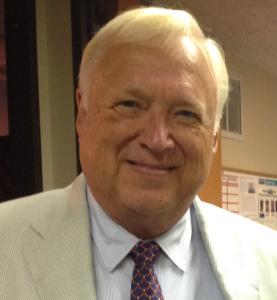
Ted Peters is a Lutheran pastor an emeritus professor at the Graduate Theological Union., He co-edits the journal, Theology and Science, with Robert John Russell on behalf of the Center for Theology and the Natural Sciences, in Berkeley, California, USA. His single volume systematic theology, God—The World’s Future, is now in the 3rd edition. He has also authored Sin: Radical Evil in Soul and Society as well as Sin Boldly: Justifying Faith for Fragile and Broken Souls. See his website: TedsTimelyTake.com.
Watch for Ted’s new 2023 book, The Voice of Public Theology, published by ATF Press.



